All Categories
Featured
Table of Contents
Double Glazed Windows Sydney in Belmont WA
That window can send more solar heat in winter season than in summertime. A west-facing window on a summer season's afternoon has an angle of occurrence from near 0 approximately 30 with a big reliable location of solar radiation. A north-facing window, in summer season, has a high angle of occurrence and a low efficient location of solar radiation, so can transmit less heat than a west-facing one.

You can quickly and easily improve the thermal performance of your home by replacing your windows. This is one of the most reliable techniques of remodelling to achieve better thermal comfort. There are thousands of types of glass and frames to select from. Selecting the right ones is important to enhancing the energy performance of your house.
Single, Double Or Secondary Glazing, Which Is The Best ... in Casaurina Perth
Single glazing with clear glass is not really effective when it comes to heat loss or gain. To improve performance, you can utilize single glazing with a more energy-efficient type of glass such as low emissivity (low-e) glass.
Multiple layers can be put together with sealed cavities in between each sheet of glass. IGUs normally use much better energy performance than single glazing, because they transmit less energy. However, the energy performance of IGUs likewise depends upon: the properties of each layer of glass. Different glass types (for instance, clear and low-e glass) can be assembled in an IGU.
The Surprising Benefits Of Double Glazing In The Summer ... in Shoalwater Perth

IGU cavities can be filled with air or a more inert, low-conductivity gas such as argon the width of the cavity. Wider cavities provide lower (better) U values, with 12mm generally accepted as the preferred space how well the cavity is sealed.
If argon is installed to the cavity in location of air, wetness is dependably excluded the level of desiccant (drying agent). The spacer (metal or polymer strip) that separates the glass layers includes a desiccant to soak up any wetness. Insufficient desiccant might trigger moisture to condense on the glass surface area in cold conditions, minimizing thermal performance.
Home Window Glazing - Sustainability Victoria in Pearsall WA
IGUs can deliver much better energy performance for all environments, particularly in heated and air-conditioned houses. Cross-section detail of single, double and triple-glazing units Low emissivity glass (typically understood as low-e glass) reduces heat transfer. Low-e glass may be either high or low transmission: High transmission low-e glass has a covering that enables daylight from the sun to enter your home to attain great solar heat gain, however reduces the quantity of the long wavelength infrared heat that can get away back through the window.
Low-e glass has either a pyrolytic coating or a vacuum-deposited thin movie metal finish. Pyrolytic finishes are durable and can be used for any glazing; vacuum-deposited finishings are soft and are only utilized within IGUs. Low-e finishes can significantly enhance both U value and SHGC; nevertheless, they should be utilized correctly or they will either weaken or stop working to carry out as needed.
Which Double Glazed Windows Are Best For Summer? in Ballajura WA
Low-e coatings can be utilized in combination with clear, toned or reflective glass. Low-e coverings on glazing can reduce heat transfer where required Image: Department of Industry, Science, Energy and Resources Toned glass has actually colouring additives included during manufacture. It is available in different colours, normally bronze, grey, blue and green.
Table of Contents
Latest Posts
A Complete Guide To Double Glazed Windows in Wexcombe Western Australia
Which Type Of Glass Is Best For Energy Efficiency? - A&l Windows in Boya Perth
Insulated Glass Unit – Igu in Joondanna Perth
More
Latest Posts
A Complete Guide To Double Glazed Windows in Wexcombe Western Australia
Which Type Of Glass Is Best For Energy Efficiency? - A&l Windows in Boya Perth
Insulated Glass Unit – Igu in Joondanna Perth